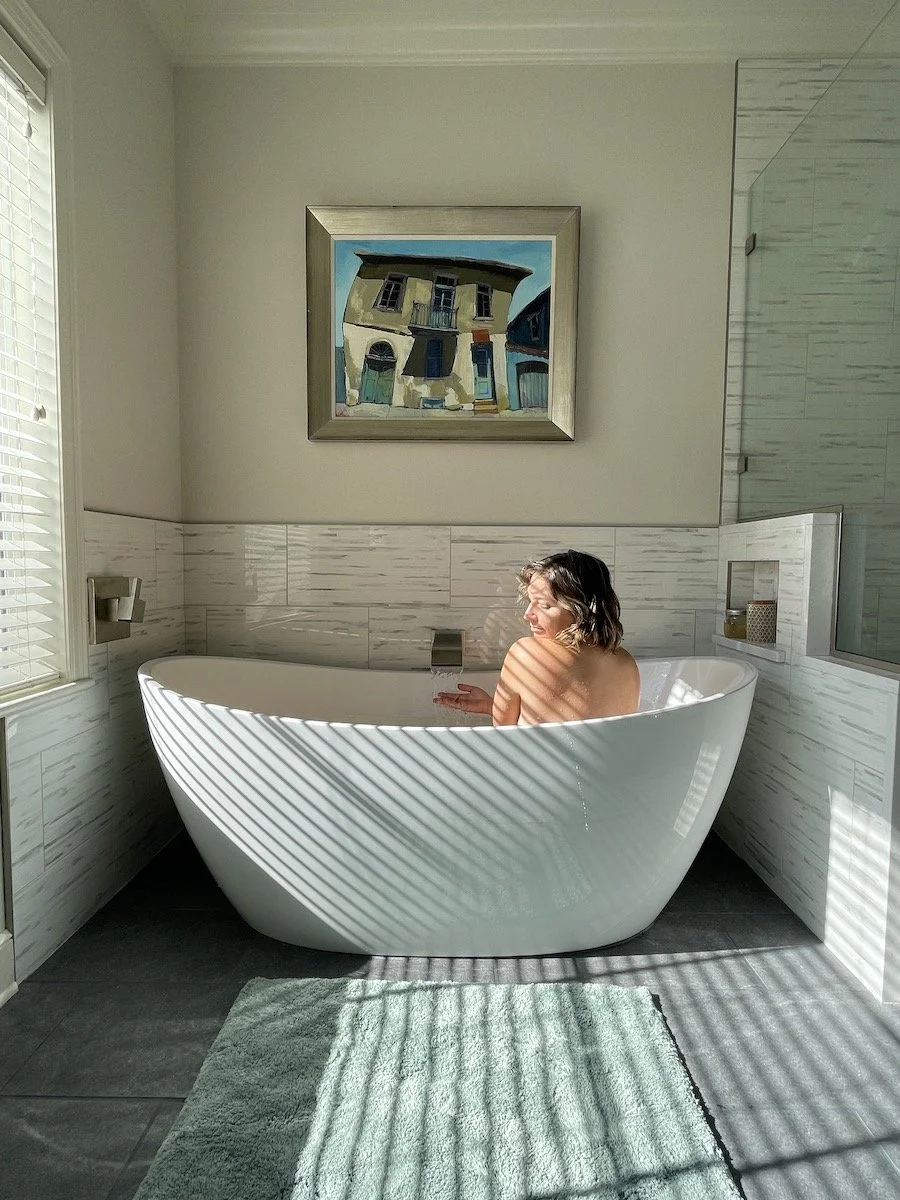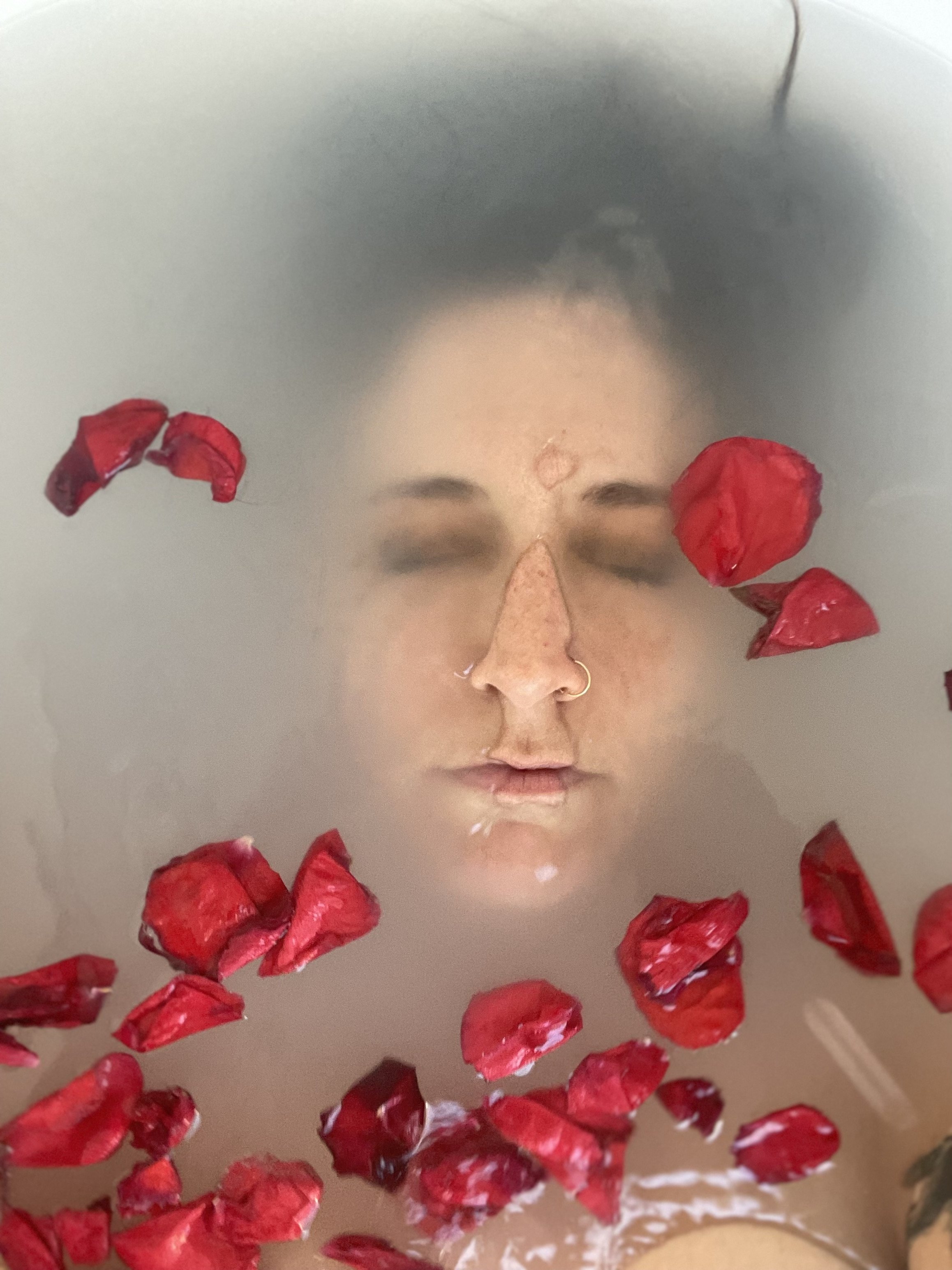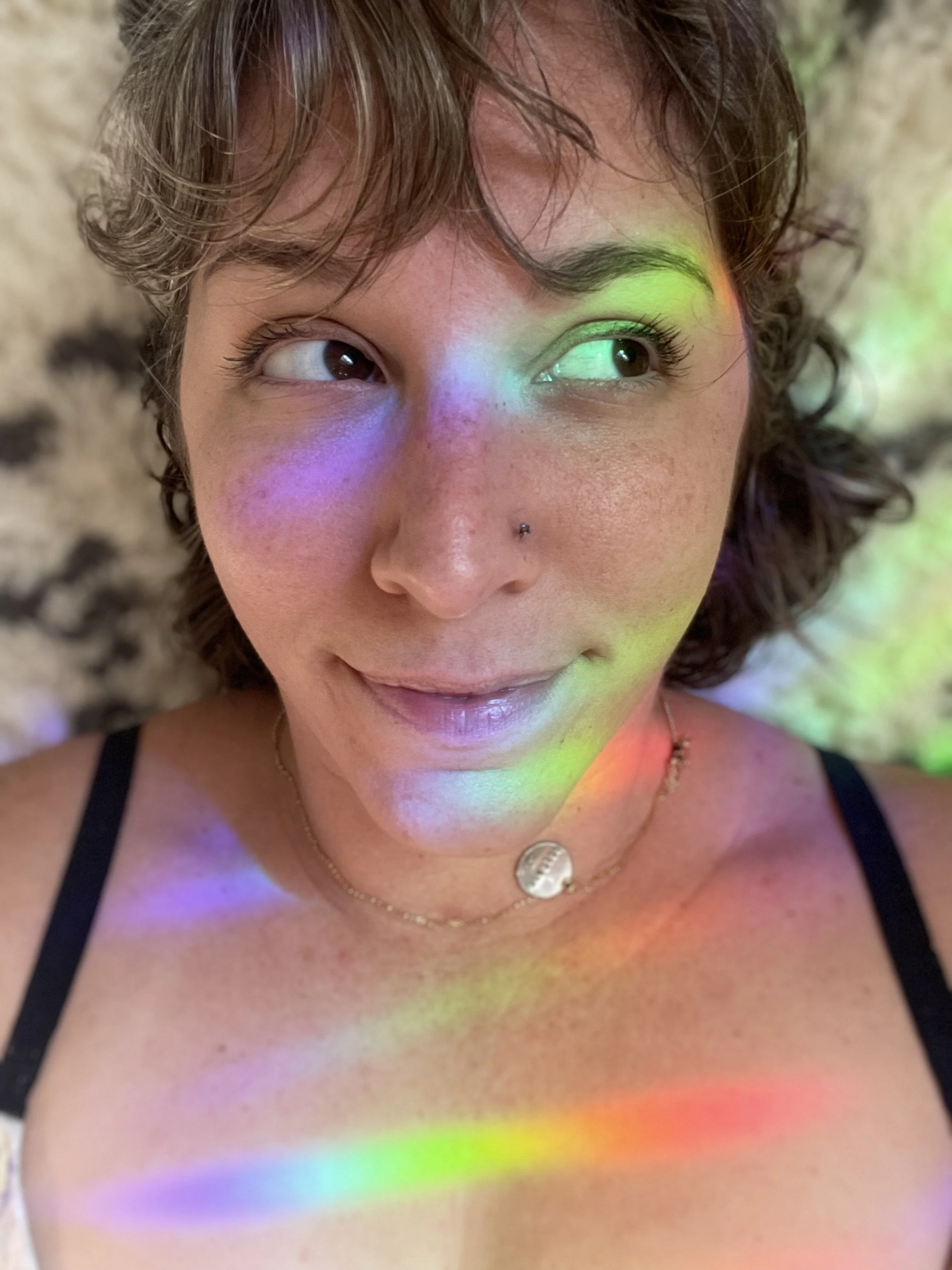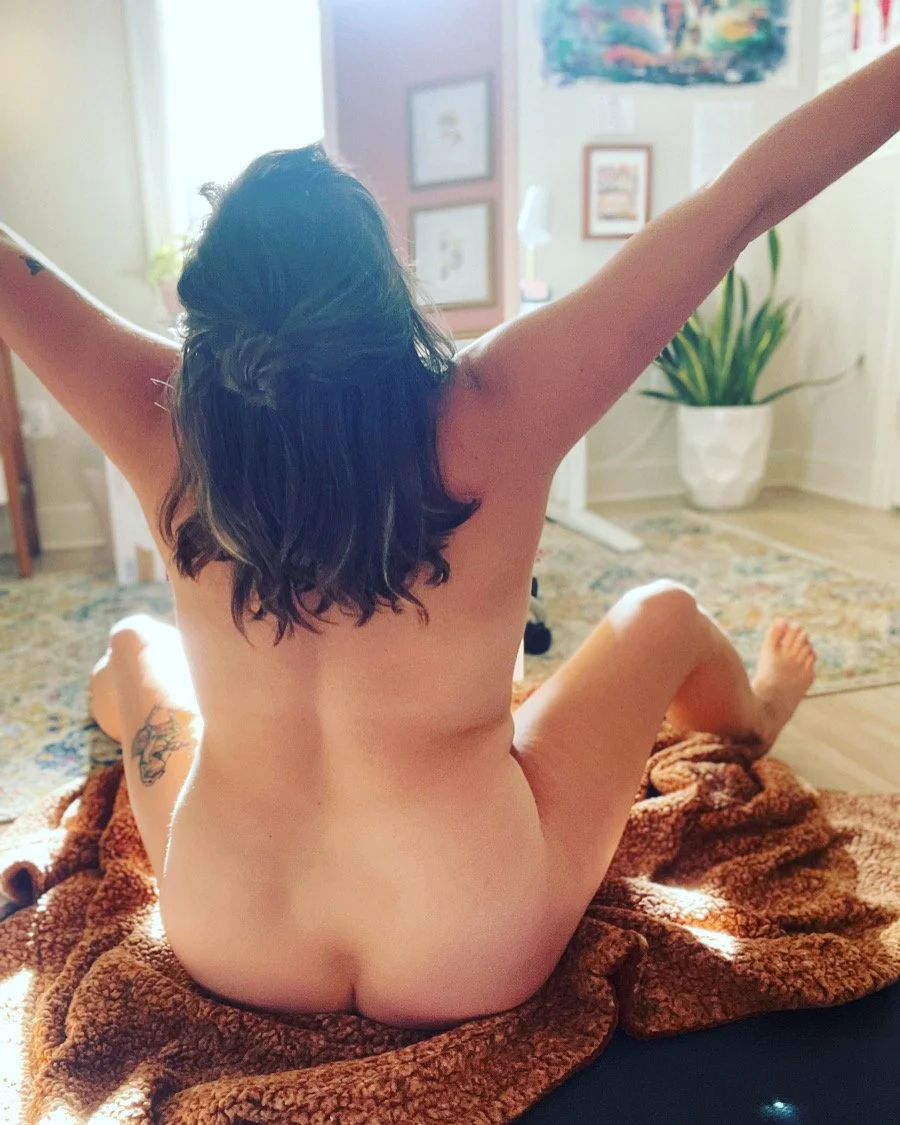
Bath or No Bath?
If you hate taking a bath, it’s probably for one of two reasons:
1) The thought of sitting still - alone - with your thoughts is daunting.
Or…
2) You’re kinnnnndaaaaa type A/ perfectionist/ neat freak + think it’s disgusting.
Am I right or … am I right? :)
There seems to be only two types of responses to baths - love em or hate em, no in-between. I’m not here to judge - I used to hate baths. My controlling, OCD-level-of-clean nature hated the thought of sitting in a room-temperature giant vat of my own grime. Gross!
But I also was incapable of being alone with myself. My mind was loud as shit - with all the chatter of the ways I fucked up or didn’t measure up. My body was in near-constant pain, screaming for attention + compassion. My sweet little heart was so lost, so defeated.
So, yea, sitting in a nasty tub alone with all that? Hard pass.
What’s your take on baths?
Beyond that, what’s your relationship with yourself?
Are you able to + interested in spending time alone? Are you open to self-awareness + self-love? Are you scared of what you may discover if you turn inwards + spend more quality time with you?
If you want a deeper, more meaningful relationship with yourself - let me know. Let’s work one-on-one to delve into the parts of you you’ve forgotten: the pain you’ve ignored, the anxiety-inducing thoughts.
Self-discovery doesn’t have to be scary + it is so, SO worth it in the long-run.
Learn more about working with me here.
The Pause Between
Written May 24, 2022
My friend described it perfectly. Life, right now, feels like that moment between an inhale + an exhale.
Do it. Take a deep breath in.
Pause… Pause… Wait.
Pause… Keep holding…
Tightening. Constricting.
Still no sigh of relief yet.
Can you sip in one more breath of air?
FUCKING PAUSE.
That’s what these last few months - years if I’m being honest - have felt like.
4 out-of-state moves in 4 years.
4 times to start over + try to settle somewhere new.
4 years of not knowing what comes next + when that fucking exhale will arrive.
4 years of holding my breath + allowing that anxiety to drown me.
4 years of unsettled ungroundedness.
4 years of feeling like I’m stuck in survival mode, unable to easily breathe in + out.
I’ve been incredibly unkind to myself these last 4 years. Feeling like a failure at so many things. Working odd jobs, knowing we wouldn’t be in one place for too long. Trying to start a business when it feels like maybe that just isn’t meant to happen for me. Struggling to make meaningful connections that I know will likely be severed in a matter of time anyway.
I am tired.
I am tired of moving.
I am tired of starting over.
I am tired of building a new community for myself every single year.
I am tired of meaningless work.
I. Am. Just. So. Tired.
10 Things for HSPs to Know
10 things I want you - as an HSP - to know:
10- You are a Human with Special Perceptions
HSP, or “Highly Sensitive Person”, doesn’t yield much empowerment, huh? It kind of sounds like you’ve got a contagious disease. I termed the phrase “Human with Special Perceptions” so that we can all feel more empowered! Because as an HSP, you DO see the world differently + that’s pretty rad!
9- The “cure” is in the slowing
Let me start by saying, there’s nothing to fix or cure. But in the beginning stages of working with your HSP trait, slowing is always the answer. Saying “no” sometimes when you want to say “yes”. Taking time to pause between tasks. Starting your day off intentionally + slower to truly check in with what you may need that day.
8- You are not alone
Sometimes being an HSP can feel pretty lonely. It can be hard to meet other HSPs, especially if you’re introverted. You are not alone + it takes time to find your people! Don’t give up <3
7- Your needs matter
Being sensitive means that you likely need spaces to be quieter + calmer. Maybe that means asking for more privacy or short breaks at work. That means communicating clearly with your partner or family about what you need to feel safe + settled around them. It’s amazing to speak up for what you want!
6- Connecting deeply with yourself invites connection with others
Getting to know yourself + understand what being an HSP is all about is highly rewarding. I find journaling to be especially helpful in getting to learn more about my inner world. What ways do you connect inward? Art? Movement? Poetry?
5- You aren’t too much / too sensitive / too emotional
You may have grown up hearing all these things + that your needs were silly because non-HSPs didn’t quite grasp how you felt. As an HSP, we do tend to experience emotions more deeply than non-HSPs, but it’s not too much!
4- You need more down time/ rest than others
Seriously. This may come more naturally to introverted HSPs but I know I still struggle with carving out time for rest - especially prior to or after a big social event or during a trip. I want to be involved in all the action but I’m also learning that my sensitive nervous system simply needs more quiet time + that’s ok!
3 - Your sensitivity is your superpower
I know, it’s kind of cheesy! But I really do hope you begin to view your sensitivity as something incredible + amazing, rather than burdensome. Anxious + sensitive people create some of the most beautiful + meaningful artwork. How can you learn to harness the power of your sensitivity?
2- Nothing is wrong with you!
I would tattoo this on every client if I could :) your sensitivity isn’t something to fix or try to get rid of. It’s just a part of you as much as your eye color, freckles, pointy nose, etc. Learning to love + embrace your sensitivity will be life changing!
1- Your gift is noticing subtleties in the world + in others - how can you share this gift?
What makes your sensitivity feel special? Not focusing on the negative/ annoying ways in which you’re different from others who aren’t HSPs. What about being HSP lights you up + helps you view the world differently?
Community Care vs. Self-Care
Whether you’re a caretaker, teacher, medical staff, entrepreneur, or barista - these past two years have been taxing on all of us. Life isn’t meant to be lived in isolation; we are quite literally wired for connection.
Self-care has become a buzz-word that emphasizes luxurious spa days + a “treat yo self” attitude. But true self-care goes beyond mani/ pedis + some extra time in the bath.
Taking care of yourself is a necessity these days.
Prioritizing your mental health over productivity.
Honoring your body’s need for rest rather than pushing through one more workout.
Setting boundaries around work to create a better work/ life balance.
Yet, no matter how tremendous your self-care routines are, have you considered your community care? Who holds space for you when you need it? Do you *feel* that sense of community that can support + help take care of you as well?
In the West, we are determined to lean into the lone-wolf archetype - fiercely independent + staunchly opposed to help from others. But does that really serve us?
For most of us, the pandemic really stripped away our connections to community. And unless you were basking in your lone-wolf solitude, your community care has likely been lacking.
So I’ll leave you with these questions to reflect / journal on:
- What is my self-care like right now? Does it need a little re-evaluation? Am I doing things to truly take care of my self?
- Am I blocking my own ability to connect with others in meaningful + vulnerable ways?
- Has my idea of community shifted since 2020? Do I even want to reconnect with my previous forms of community?
- In what ways can I reconnect with community + allow for their support?
What is Trauma Informed Yoga + What are its Benefits?
I wrote this article for STAR - Sexual Trauma Awareness + Response, a non-profit here in Baton Rouge dedicated to resourcing survivors with legal aid, counseling, + more after sexual assault.
Trauma-informed yoga (TIY) is intended to help students reconnect with their bodies after experiencing short- or long-term trauma. TIY approaches the practice of yoga with consideration of the effects that trauma has on a person’s brain, nervous system, body, spirit, and heart.
What is trauma?
You’ve likely experienced some degree of trauma at one point in your life. This may have been a “little t” trauma — a stressful move, career change, or financial worries; or maybe you’ve experienced “big T” traumas — sexual assault, physical abuse, or ongoing oppression.
If you were unable to dedicate time, space, and resources to heal from the trauma, you may notice its effects on your body, mind, heart, and spirit: tight muscles, disconnection, racing thoughts, hyper-vigilance, hopelessness, resentment, and more.
How trauma-informed yoga can help?
First, it should be noted that yoga, even TIY, is not intended to be used as a stand-alone tool for healing from trauma. It is always recommended that a survivor of trauma be under the care of a psychologist or other mental health professional.
TIY — also referred to as trauma-sensitive or trauma-conscious yoga — often includes: breath work, slow/ grounding postures, and intentional, inviting language rather than commands. Students are offered multiple options throughout the class so that they may feel safe both during and after class. An example of this may be, “explore what it may feel like to lift your arms overhead” versus “lift your arms overhead”. In providing an opportunity for a person to experience a body movement by choice can give a survivor of trauma more autonomy over their bodies during the practice. And over time, this can support a survivor in regaining a sense of control in their life.
Physical postures (called “asana” in yoga) and breath awareness allow students to learn how to stay in the present moment and can help survivors with centering and grounding.
Trauma-informed yoga may help you:
· Connect deeply with your physical body
· Learn to release tension from your body
· Gain more awareness of your breath, thoughts, and movements
· Reduce fear responses in your physical body
· Empower yourself to heal holistically — body, mind, heart
· Feel safe to experience any physical sensations that may arise in your body
Join STAR in honoring Sexual Assault Awareness Month in April. I will be hosting a class at Electric Depot in Baton Rouge on April 12th at 6 PM.
Photograph by Hannah Sharriee.
All Are Welcome Here
You may have noticed that yoga in the west has been co-opted by thin, white, able-bodied cis white women … myself included.
And it ~should~ go without saying but …
If you are …
Trans
Black
Queer
Fat
Brown
In pain
Experiencing grief
“Too old”
Inflexible
Deaf
Shy
Brand new to yoga
English is your second language
Or any other reason you imagine you don’t belong in a yoga studio -
You are welcome in my spaces.
Whether that’s an in-person yoga class, a coaching session, or simply here on this platform. You are welcome in my spaces.
Whether it's day 1 of your yoga/ spiritual journey or year 10.
You are welcome in my spaces. I’m happy to have you here.
If you have a problem with any of the groups of people I listed above… well, you probably won’t enjoy being in my spaces. But you are still welcome to be here too.
I hope you learn to open your heart + put down your bigotry / fat phobia / racism / etc.
E X P A N D
My intention for 2021 was to E X P A N D.
In my business + mindset + skillset + emotional intelligence + my own power.
And each time I thought about my intention or shared it, there was a (not so small) voice in the back of my mind yelling - “yea, but not physically! WE WILL NOT EXPAND PHYSICALLY.”
Now, before I go on - I fully realize + acknowledge my privilege as a still-thin, able-bodied, white, cis woman…*
I share my story because I believe that body image + acceptance / neutrality is something ~ everyone ~ can heal from.
Maybe it was growing up in the toxic realm of dancing.
Maybe it’s simply existing as a girl/ woman in this world.
Maybe it’s the white/thin-washing of yoga.
Maybe it’s being a coach in health + wellness.
But I have never felt skinny enough.
That little voice that was so fearful of expanding physically led me to realize I still had work to do on fully accepting + loving myself.
Spending this past year learning to love this expanding body was a trip. Was it getting OFF hormonal birth control for the first time since age 18? Was it getting ON antidepressants? Was it the handy-pandyemic? Was it finally realizing my own fat phobia + having compassion for myself to let that fear go?
I know the start of the year “encourages” a lot of us to slim down, tone up, shed the holiday weight. I just want to let you know that that IS NOT necessary.
Weight gain doesn’t make you a bad person.
A bigger body is not something to fear or hate.
So whether you’re brand spankin’ new to body acceptance or if you’ve been unlearning the harms of diet culture for a minute now - I hope you continue to love + accept your FULL EXPANSIVE self in this year to come.
[*I’d like to remind you that the anti-dieting + anti-fat phobia movements were both engineered by queer, Black, fat women. I never want to be the face of body positivity. But I do know how important it is to share our stories as women in this fucked up, patriarchal, white supremacist world.
And if just one person sees this + decides it’s time to love their body - no matter the size - that’s all I want.]







